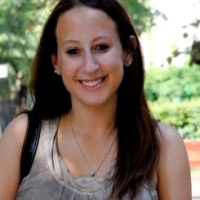It was with incredible sadness that I learned about the death of 21-year-old Andrew Pochter. He was raised in Maryland, studied at Kenyon, and traveled to Egypt to teach English to children for the summer. On Friday he was fatally stabbed in a protest against Mohamed Morsi in Alexandria.The death of any civilian is terrible. And still, his hit especially close to home for me.
Andrew and I were the same age, grew up in similar towns, were both active in our campus Hillels, and both cared deeply about the happenings in the Middle East. I never met him, but our shared values and upbringings made me react to his death in a particularly visceral way. I just finished my junior year and had so many smart, interesting and idealistic friends study abroad in various Middle Eastern countries. It could have been me. It could have been any of them.

That was why reading Batya and Yisrael Medad’s posts about the death of Andrew Pochter made my skin crawl. For background: Yisrael Medad is a regular contributor to The Jerusalem Post, a member of the Executive Board of Israel’s Media Watch, and a foreign media spokesperson for the settlers’ Yesha Council of Jewish Communities. His wife, Batya, is a newspaper columnist and lives with him in the settlement of Shiloh in the northern West Bank.
In The Jewish Press, Batya wrote an outrageous post entitled, “Why Was Andrew Pochter in Egypt, Not Israel?” She asks, “Are you disturbed by the fact that an American Jewish student is more attracted to Arab society than to Jewish Israeli society?” She wonders if Andrew’s parents “supported his delusion” that he could make a difference in Egypt. And, in the wake of his death, she even asks whether Andrew realized there is “better medical care” in Israel. It “bothers” her that Jewish Americans would truly care about countries other than Israel in the Middle East.
Batya Medad found the situation “disturbing,” but for reasons very different from why I felt so disturbed by Andrew’s death.
Her husband published an equally reprehensible post entitled “Pochter’s Past Left Him No Future.” He snidely points out that Andrew was raised in a family with both Jewish and Christian parents, and concludes:
Unfortunately, there are too many American Jewish students with:- no proper knowledge of the Middle East, Arab culture and Islamist custom;- too much enthusiasm and passion;- a progressive/liberal outlook;- too little Jewish background.
Andrew Pochter’s death came far too soon, but he will not die in vain. His life represents the hope of a better, more compassionate and just future. The Medads and others like them still see the world through an “us versus them” prism, still refuse to see how people in the Middle East are interconnected, and still oppose Jewish American interest in any Middle Eastern country other than Israel. But Andrew’s memory, volunteerism, leadership and activism will continue to inspire and guide the rest of us left to further the work he recognized was so important. And I sincerely hope Batya and Yisrael will one day realize that the events, people and conditions in other countries can and will directly impact the events, people and conditions in their own lives. If they refuse to accept this, then they are the ones who are delusional.






